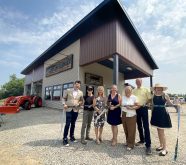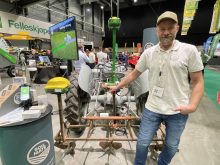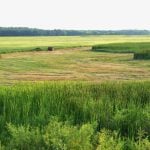If a farm from Huron, Perth or Middlesex planned a drainage project this year, some of the plastic used in the tile likely had a former life as shampoo bottles and laundry detergent jugs on those same farms.
For about 14 months now, an agreement has been in place between Bluewater Pipe and Listowel-based EFS Plastics for the drainage tile company to use a set percentage of high-density polyethylene (HDPE) plastic pellets in its tile. EFS Plastics makes the pellets from recovered consumer packaging with the number “2” in the three-arrow recycling logo from the Huron Park-based Bluewater Recycling Association (BRA).
Why it matters: Local companies supporting local companies helps build economic opportunities close to home for rural and small-town residents.
Read Also

Canada seventh-most influential country on agri-food
Report from Dalhousie University and MNP shows Canada ranks seventh among G20 countries on agri-food influence.
“So many people, I think, don’t understand recycling and that it’s actually happening right here in our community,” said Tony Kime, founder of Huron Park-based drainage tile manufacturer Bluewater Pipe.
“I’ve never had such a tight collection loop,” he said, adding his company previously sourced its recycled HDPE plastic from a variety of locations including the GTA, British Columbia and the United States. That continues to some degree, but thanks to the three-company agreement, the supply chain is much tighter-knit for what Kime estimates is enough four-inch tile annually to drain more than 1,600 acres on 30-inch spacing.
“And we’re all local companies employing local people.”
BRA is a not-for-profit consortium owned by 20 southwestern Ontario municipalities, which originated in the late 1980s when the original owners recognized that private-sector blue-box recycling companies didn’t have rural Ontario in their business growth plans. According to President Francis Veilleux, it collects recyclables from approximately 80,000 households and has on-site handling facilities at its Huron Park location for four of the types of plastic collected through its municipal program.
“Governments around the world have been talking about closing that loop by using recycled plastic within the region where it’s produced,” Veilleux said. And BRA’s leadership has identified that as a goal.
Currently, two local companies accept bales of plastic from BRA. Ice River in Feversham takes PET (number “1”) bottles for recycling into bottled water containers. And EFS Plastics, which operates a 75,000 square foot facility in Listowel and another in Pennsylvania, takes in HDPE – which, Veilleux explains, are generally “all plastic bottles that are not see-through” such as shampoo containers.
EFS, he adds, “was always one of our first options” for sending HDPE containers but when the Listowel company didn’t need any, the baled plastic was sent elsewhere. Now, thanks to Bluewater Pipe’s commitment, all of BRA’s number 2 plastic has been going to EFS for 14 months. Veilleux estimates that’s about 450 tonnes of plastic recycled locally into drainage tile that has been or will be installed in local fields.
“It’s been so great because (BRA and Bluewater Pipe) are neighbours in Huron Park. (EFS) can send a truck down to deliver plastic pellets for Bluewater Pipe and they can pick up a few bales of plastic bottles from us.”
He added, “what Tony has done has gone above and beyond.”
Kime says he speaks from decades of experience in the drainage tile industry – which has been using recycled plastic for many years – that some steps in that process make better economic sense when undertaken on a large scale. So, from a purely financial standpoint and depending on the plastics market at any given time, it’s not necessarily the best business decision for Bluewater Pipe to lock into the BRA/EFS Plastics supply chain.
But he says sticking to the agreement is a testament to the strong community responsibility of Bluewater Pipe, and more recently of the Quebec-based Poirier family that this year purchased a financial stake in the business.
Veilleux agrees the arrangement gives all three companies huge community appeal.
“Now, any resident who comes to us and says, ‘what are you doing with that stuff anyway? Is it all going to China or something?’ And I can turn around and say, ‘No, it’s all getting processed locally and the recycled material is all being used locally.”
“We’d love it if we could do that with all our (plastic) commodities.”















